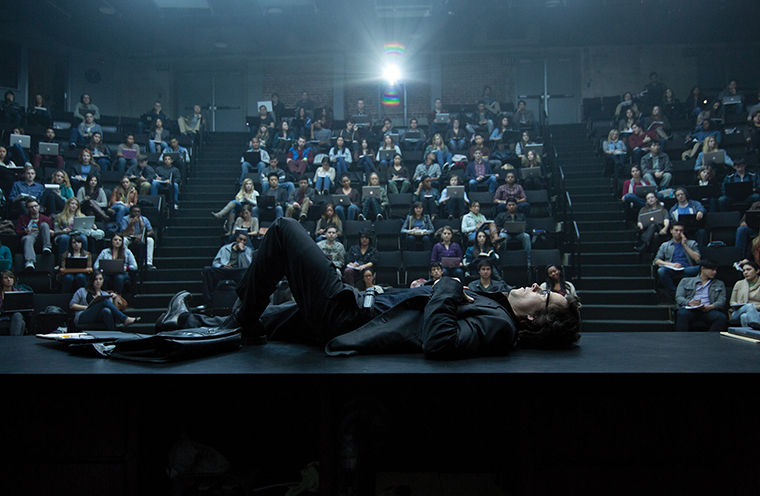Director goes all in with new film ‘The Gambler’
Mark Wahlberg stars in director Rupert Wyatt’s third feature film, “The Gambler,” which is set to be released Dec. 26 through Paramount Pictures.
December 8, 2014
Director Rupert Wyatt is still new to the Hollywood landscape. Having only directed three feature films—“The Escapist,” “Rise of the Planet of the Apes” and “The Gambler”—he is still learning how the film industry works.
Wyatt, originally from the United Kingdom, worked in London and Liverpool directing and writing episodes of various TV shows in the early 2000s. He studied film in Paris. Wyatt’s first feature film, 2008’s “The Escapist,” starred Brian Cox, Joseph Fiennes and Damian Lewis and won the British Independent Film Award and a BAFTA Scotland Award.
His latest film, “The Gambler,” tells the story of a literature professor and high stakes gambler (Mark Wahlberg), who runs into a conflict with a loan shark (John Goodman) and his gangsters, all while having an affair with one of his students. The film is set to premier Dec. 26 through Paramount Pictures.
The Chronicle spoke with Wyatt about how directing “The Gambler” compared to directing his other films, the depiction of gambling in the movie and what he wants viewers to take away from the film.
THE CHRONICLE: How did directing “The Gambler” compare to your other projects?
RUPERT WYATT: I got to sleep in my own bed, which is rare. The film I did before, “Rise of The Planet of the Apes”—that was much more logistically demanding. “The Gambler” was really just having an opportunity to work with the actors on location with not so many sets or green screens. It was more like theater in that sense, which was great. Working with actors of the experience of [Jessica Lange and Wahlberg], that was something that I hadn’t done before. I worked in a much more independent way on my early films [with lower profile actors].
How did you balance your vision for the characters in the movie with how the actors portrayed them?
RW: It’s always a combination between the two. For any actor, no matter how accomplished they are, you have to give them some foundation to expand their roles off of. Great actors have turned in terrible performances, and sometimes actors who are not in the same league as, let’s say Marlon Brando, can turn in something truly great. It all comes from the shaping [and collaboration between the director and actors]. At the end of the day, the job of the director is simply being a mirror. You put the mirror in front of the actors and show them how they sit within the world of the movie.
Was there a specific way you wanted to depict gambling in the movie?
RW: The original movie that this is based on is a totally different film about a gambling addict. This film, for me, is about a man who uses gambling as a way to get out and escape from his life. He even goes as far as saying at the end of the movie, “I’m not actually a gambler.” The addiction, to me, is never really there. It’s more about a guy who is fed up with his life and blows it all up and starts again. With the notion of gambling, what I found most appealing was how we gamble with our lives. Who we fall in love with, the jobs that we take—those are all things you can win or lose at. Those are the choices you make and some you win, some you lose. That was how I chose to tell the story rather than circling the drain of this man’s addiction.
How is this adaptation of the film different from the 1974 version directed by Karel Reisz?
RW: The original film was written by James Toback, who based it off, in part, his own life experiences. It’s a much more autobiographical piece. This film is not that. I came to it with the idea that we were coming at [the story] from a completely different angle. Taking the idea of the title “The Gambler” and then turning it on its head in the sense of this is not about a guy who can’t help himself who has to go back to the tables and keep on gambling. This is actually a guy who has all of this money, all of this education, this talent and he says, “I’m not happy, I don’t want it all, so I’m just going to get rid of it all.” That’s why he keeps on going back, just to get rid of all of [his money], which is not necessarily the most appealing idea to watch or be a part of because we are all programmed to be aspirational and want to win and achieve things, and this is totally different from that.
What do you want viewers to walk away with after watching this film?
RW: [I want viewers to walk away with] the idea that they would like to see more character-driven movies in Hollywood. That was why I originally took the job—to really explore within the studio system the opportunity to make something that was less about specific set pieces or the moments within the film. This, to me, was a really interesting story of a man’s journey, and I think the resonance of that is gradually migrating toward cable television and long-form storytelling, which I think is fantastic. But there’s a certain sadness in the sense of going to the cinema is what it should all be about and seeing really interesting stories play out with an audience.








